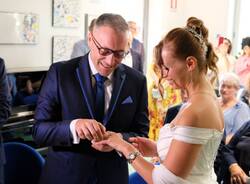LIUC, 25 years as a start-up
To celebrate their anniversary, LIUC University have published a book containing 25 entrepreneurial stories of former students. During the interview below, the Chancellor of the university, Federico Visconti, explained the reasons behind this decision.

Often, actions precede words. Twenty five years ago, when the Union of Industrialists decided to found the LIUC University, not only was the word “start-up” not as common in Italy as it is today, but it did not encompass the special idea of a new economic frontier that it now has. This semantic leap was helped by the Internet, by connectivity, that is, a structure that can create a new culture, even in the entrepreneurial field.
For its first 25 years of existence, LIUC University has decided to publish a book entitled “Startup! 25 anni di Università e impresa” (“Start-up! 25 years of University and Enterprise”), published by Guerini Next, where the exclamation mark shields the authors (the book has several) from excessively literal interpretations. Twenty-five cases and just as many entrepreneurial stories, some of which are already well-established, while others are at the development stage, where the protagonists are entrepreneurs who studied at the university in Castellanza, a production line of knowledge and, at the same time, practical work, because it was founded, and is attended by entrepreneurs.
The Chancellor Federico Visconti, who describes himself as a business economist, rather than just an economist; loves the classic foundries, but does not like fashionable definitions nor classic celebratory events.
Mr Visconti, is this why you decided to publish a book containing entrepreneurial “hopes”?
“Giving voice to our young men and women who have set up a business is anything but a celebration in its classic sense. My idea was to write a book similar to what Fabio Magrino wrote in 1984 with his work “The new entrepreneurs”, in which he analysed twenty innovative entrepreneurial stories. So we involved twenty five lecturers, not only business economists, but from various disciplines, who recount the same number of entrepreneurial stories.”
Although the title “Start-up!” is written with an exclamation mark, it conjures up the idea of an innovative, hi-tech business model. In what way can LIUC be considered a start-up?
“LIUC is a source of entrepreneurship, providing an innovative teaching format that involves tenured lecturers, managers, professionals and testimonials. It has an original story, it’s a university created by businesses for businesses. It has strong links with the local area and it encourages a direct relationship with high schools, which is a very important aspect for identifying needs starting from the bottom. At LIUC, there’s a special atmosphere. It’s an atmosphere that comes from relationships, and our students who have become entrepreneurs are happy to see their lecturers again, to compare their experiences. In the book, we try to grasp this aspect.”
What do you think of the start-up phenomenon and of the debate surrounding the new way of running a business?
“I acknowledge that this topic needs a detailed study. Recently, the “Financial Times” posed a leading question: Why are there only fifteen unicorns? And why is the SEC, the American Stock Exchange, questioning itself about the evaluation parameters of start-ups? These questions were also asked at the beginning of the 2000s, when the ‘dot coms’ had to be evaluated. On this matter, I remember an incisive work by Claudio Dematté, in which he said that we were all wrong: the board members, the lecturers, the auditing companies, the Stock Exchange, the authorities. Today, I think that if we continue to emphasise the model of Silicon Valley and of its start-ups, we’ll run the same risk as then. That’s not our model.”
Will be there a middle way between Silicon Valley, where good ideas are funded, even those that end up as failures, and Italy, where risk capital for start-ups is almost non-existent? I remember one lecturer, Ms Anna Gervasoni, here at LIUC, who presented an interesting study on venture capital that showed that, in Italy, funding for new innovative businesses was embarrassingly low, not just compared to California, but also to the whole of Europe.
“The theme of funding for start-ups needs to be reviewed, and it’s also true that Italy doesn’t have that kind of capitalism. It’s no coincidence that Mr Innocenzo Cipolletta, the Chairman of AIFI (the Italian Association for Private Equity and Venture Capital), an authoritative speaker, who can tell us how funding for small and medium-sized Italian businesses is developing, was also among those at the book’s presentation.”
Talking about the residual nature of venture capital, how important is the fact that, in Italy, as a result of cultural and religious heritage, bankruptcy is still seen as a sin and not simply as an attempt gone wrong that could have interesting technological consequences on the system?
A: Very, and the President of LIUC, Michele Graglia, explains this in his introduction to the book. In the situation we’re in today, I think we should be more tolerant of mistakes. In the years of the economic boom, a bankrupt businessperson was often seen as a con artist; today, a bankruptcy is often due to a lack of coherence in the entrepreneurial plan.
What does restarting depend on?
“The problem with restarting is ideas, and in its own small way, this book is a list of ideas, some of which are quite sound. But, as well as ideas, you need money, of which, in Italy, there is no shortage, but it isn’t introduced into the circuit of the real economy, but feeds a financial system that is self-referenced and has just indirect effects on these projects. In the USA, there are large funds that invest a percentage or their resources in start-ups in Silicon Valley and in new businesses, but in Italy, I can’t see a large banking group supporting these projects. In the companies, the topic of funding is well-known. Before calling this an economic matter, I’d say it was cultural, broadly speaking.”
If the topic is cultural, it must be the job of a university to tackle and develop it.
“Recently, in the newspaper Corriere della Sera, the manager Andrea Guerra claimed that we need a new generation of entrepreneurs, for politics to modernise before Italian businesses. I think that, over these 25 years, LIUC has made a good contribution to bringing ideas, stimuli and new managerial skills into businesses. If one of our 25-year-old engineers learns the Lean method and then goes to work in a small company in Busto Arsizio, he’ll bring with him that managerial contribution. The ecosystem works when it is able to bring ideas and skills into the existing fabric.”The modernisation of the entrepreneurial system is important, but it is often the institutional context that is the real problem for the entrepreneur.
“It’s important to distinguish the culture of development from that of control; they’re two different things, and reasoning on the basis of approvals is exhausting, above all for people in business. This is a country that closes up a hedgehog, and in the end, people don’t decide but choose to stay where they are. If we want new businesses to choose to employ, we have to free people of the anxiety of control.”
TAG ARTICOLO
La community di VareseNews
Loro ne fanno già parte
Ultimi commenti
fratetoc su Malpensa e Superstrada blindate per le Olimpiadi: scatta la chiusura della 336
Andrea Camurani su Forti rallentamenti per neve, la situazione sulle strade in provincia di Varese
Bustocco-71 su Forti rallentamenti per neve, la situazione sulle strade in provincia di Varese
PaoloFilterfree su “Ho sfiorato il cielo”: Paolo De Chiesa racconta la sua vita dalle vittorie sugli sci al colpo di pistola al volto
PaoloFilterfree su La presidenza come feed
Viacolvento su Gli aumenti nelle rette e il rischio-defezioni alla Fondazione Scuole Materne di Gallarate




















Accedi o registrati per commentare questo articolo.
L'email è richiesta ma non verrà mostrata ai visitatori. Il contenuto di questo commento esprime il pensiero dell'autore e non rappresenta la linea editoriale di VareseNews.it, che rimane autonoma e indipendente. I messaggi inclusi nei commenti non sono testi giornalistici, ma post inviati dai singoli lettori che possono essere automaticamente pubblicati senza filtro preventivo. I commenti che includano uno o più link a siti esterni verranno rimossi in automatico dal sistema.